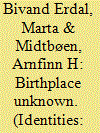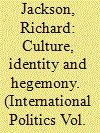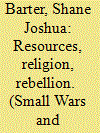|
|
|
Sort Order |
|
|
|
Items / Page
|
|
|
|
|
|
|
| Srl | Item |
| 1 |
ID:
190117


|
|
|
|
|
| Summary/Abstract |
When naturalised citizens receive their passport, it is material and symbolic proof of membership in the nation-state, tying the individual to the nation and providing mobility resources. For naturalised Norwegian citizens, their birthplace appears in the passport. What might be the implications of removing this information? In 2016, the Norwegian government replaced birthplace details with ‘birthplace unknown’ in the passports of naturalised citizens from 31 Asian and African countries. Drawing on this case and 41 in-depth interviews with people of different citizenship-statuses, we analyse the role of the passport and birthplace information in it for naturalised citizens’ identity-construction. The procedural change led to an experience of devalued citizenship in practical, emotional, and symbolic ways, by those directly affected and others, showing the precariousness of identity for naturalised citizens. We find that the passport matters for identity-construction, as a symbol of national belonging, and suggests more-than-instrumental approaches to citizenship among immigrant populations.
|
|
|
|
|
|
|
|
|
|
|
|
|
|
|
|
| 2 |
ID:
105370


|
|
|
|
|
| Publication |
2011.
|
| Summary/Abstract |
This article explores the social and political construction of US counterterrorism policy since the onset of the war on terrorism. The first part of the article focuses on the period of the Bush administration. It explores the cultural grammar expressed in the language of the war on terror, as well as administration attempts to 'sell' the policy to the American public. In addition, it explores the ways in which the war on terror has been institutionalised in counterterrorism practices and institutions, and how it has been normalised and embedded in American popular culture and linked by the national identity narratives surrounding '9/11' and the negative ideograph of 'terrorism', to American identity. Section two of the article explores the discourse and practice of the war on terrorism in the initial period of the Obama administration. It questions the extent to which counterterrorism policy can be rewritten, given the degree to which it accords with the deep cultural grammar of American identity and is now a well-established ideograph, the extent to which it has been institutionalised in American political practice and embedded in American culture and the ways in which it is rooted in the political-economic interests of the American polity and empire. Finally, the article briefly reflects on questions of change and identity in the construction of US foreign policy.
|
|
|
|
|
|
|
|
|
|
|
|
|
|
|
|
| 3 |
ID:
080787


|
|
|
|
|
| Publication |
2008.
|
| Summary/Abstract |
A clear understanding of what creates a conflict is central to building a lasting peace. This paper targets two common misconceptions which cloud analyses of the recent separatist conflict in Aceh. First, the conflict was not about oil. Resource curse theories help explain the creation of the Free Aceh Movement (GAM), but cannot explain why the conflict remained limited for several years. The lessons here are that what motivates a conflict varies over time and across groups. Second, despite Acehnese history, identity, and global trends, the conflict was not marked by Islam. Instead, the GAM promoted ethnic nationalism and downplayed religion to sustain the conflict and their control of it. The lesson here is how leaders can shape, but cannot determine the identity of movements. Beyond these two misconceptions, I move towards explaining the causal mechanisms of the Aceh conflict and assessing this model in light of post-Tsunami developments
|
|
|
|
|
|
|
|
|
|
|
|
|
|
|
|
|
|
|
|
|